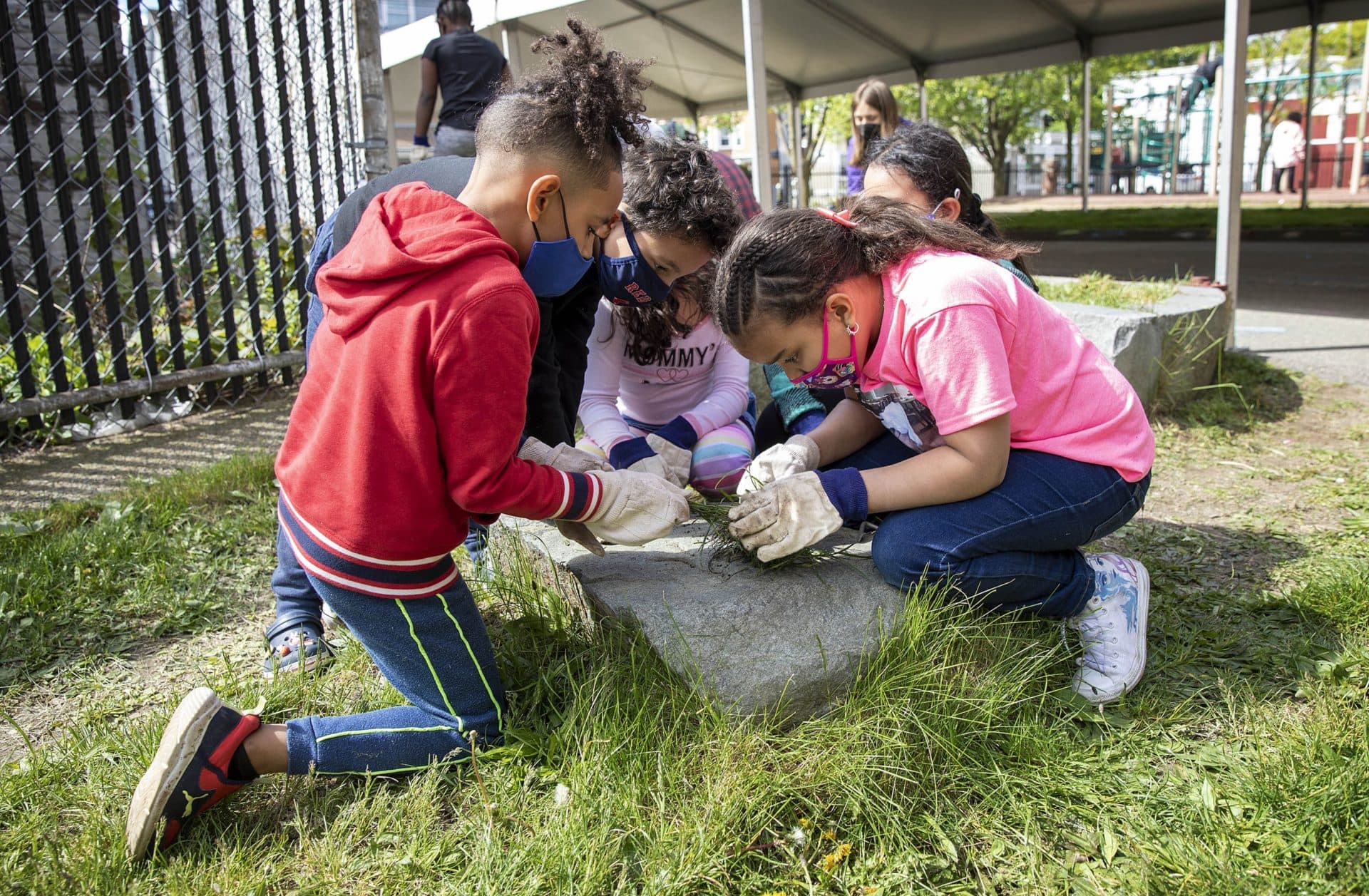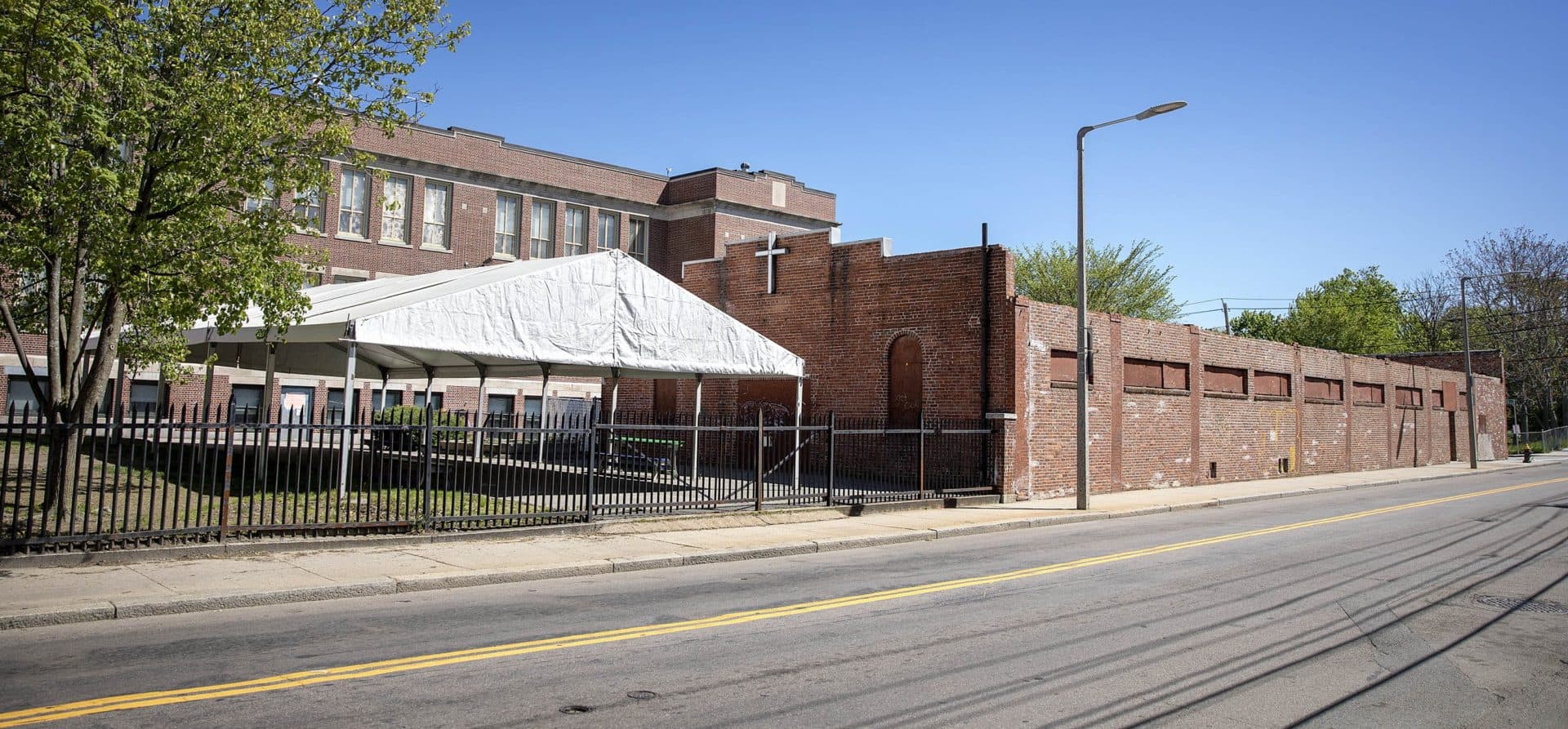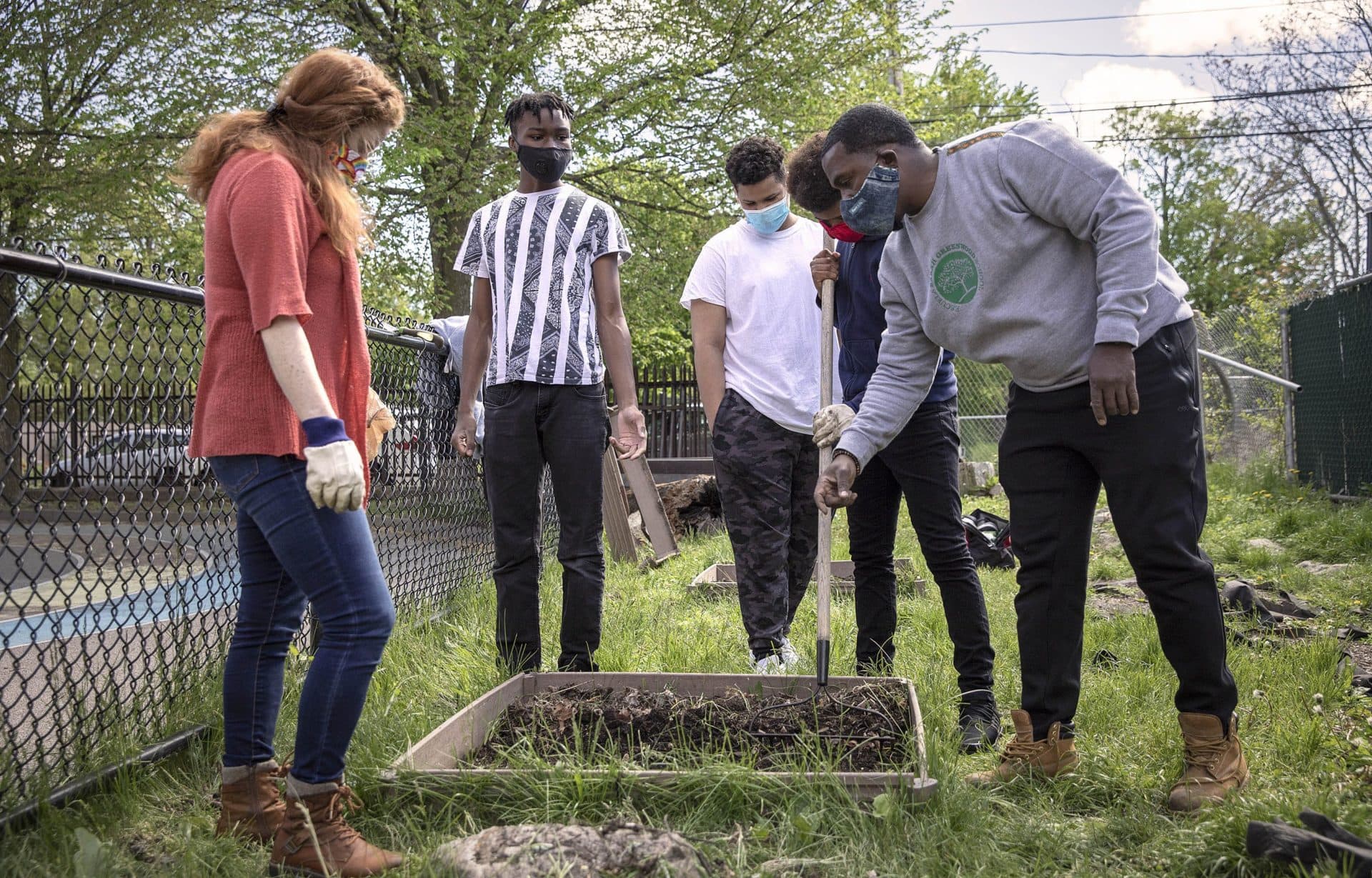Advertisement
Unexpected Lessons
After A Year Mostly Indoors, Possibilities Bloom In A Schoolyard Garden

Most of the Sarah Greenwood School in Dorchester's Grove Hall neighborhood is surrounded by cement, with four-square courts and some basketball hoops. The corner of its block is occupied by the crumbling facade of a former church — which occasionally sheds trash, even a knife and syringes, into the schoolyard.
Then, in between the two, on a narrow stretch of grass is the school's new garden plot. Each week, it plays host to rotating groups of students from across the school's eight grades, for the moment weeding, tilling and looking at things up close.
Join WBUR Thursday, May 20, at 6 p.m. for a Cityspace conversation about the losses and lessons of pandemic schooling. The event is open to the public and over Zoom.
Crystal Alcala brings her second-graders out into the garden at least twice a week, where they unearth and identify bugs, dig up weeds and talk in an energetic mix of English and Spanish — the Greenwood is a dual-language school — about deforestation, overfishing and healthy soil.
It’s been a nice addition for all the school's students, Alcala says: “Just taking a deep breath — that has been a blessing as well. We’ll spread out and do a little ‘mask break’ ... and you can see it in their faces, the relief."

Alcala has wanted to plant a garden at the Greenwood since she arrived as a teacher three years ago. She grew up in southern California, the daughter of Mexican immigrants, where her father worked in a plant nursery. But she wasn't an avid gardener herself. The idea had more to do with brightening an outmoded schoolyard, and giving the school's predominantly Latino and low-income students a space to take that deep breath (as well as to yell and play).
Being hands-on, liberated, social and (usually) safe, outdoor learning seems like an ideal remedy for the past year's virtual, isolated, indoor learning. It remains to be seen, though, whether an educational system intent on returning to normal can maintain this year's deepened connections to the outdoors after pandemic restrictions wane away. If administrators and teachers see their primary goal as making up for the past year’s “learning loss,” outdoor educational time may come to seem, once more, like a luxury.
But a group of parents at the Greenwood says the time has come for a reckoning with the unequal distribution: of infrastructure, resources — even of beauty — among schools in Boston and beyond.
Advertisement
This spring, they are stepping up a campaign to renew the school’s facilities, inside and out — and have pressed mayoral candidates Andrea Campbell and Michelle Wu about what happens next.
The Greenwood building is nearly a century old, and looks it. Until recent repairs, its windows sometimes dropped like guillotines, radiators can still get dangerously hot in the winter, and the school’s ventilation system was rated as “poor” in a 2016 audit.
Despite years of lobbying, Franklin Peralta, a father of two at the school, says Boston Public Schools and city leadership still won't commit to any major renewal of the Greenwood building, let alone to building a new school.

So far, the parents’ push to buy up that abandoned lot and modernize the schoolyard has also been stymied.
“Close your eyes and imagine us expanding that garden, and how much different that would be,” Peralta says. "I have to say, that looks like a dream right now. Is that because of the population that we are serving?”
Peralta works for a nonprofit helping immigrants in greater Boston learn English. And he is keenly aware of how little rich outdoor time is available to many Greenwood students when they're not in school.
“Twenty percent of our families are living in shelters right now. And many of them — low-income people — are living in crowded apartments, in Section 8, with zero open-space access,” Peralta said. "That means the school is those students’ principal opportunity to have a “real outdoor experience.”
The Greenwood is not alone in confronting that dilemma. At a moment when outdoor learning has reappeared in its full potential, many schools — especially those with the most high-needs students — are still not equipped to provide it. The most thoughtful outdoor curriculum is still mainly the province of private, and often pricey, preschools and camps.
Alcala acknowledges that parents want more — and students deserve more than she can accomplish with a $5,000 grant — to be spent entirely on supplies.
“They say, ‘Why can’t we grab this space?' " she says. " 'Expand our yard so kids have a soccer field, a field to run on, so they’re not running on the blacktop all day long?’ ”
But that decision will involve district officials, a land purchase and construction. In the interim, Alcala and several colleagues, in true gardeners' spirit, are trying to make the best of what they’ve been given.
Alcala hopes to plant a barrier between the school yard and the church lot: “I’m gonna be planting squash, with the vines all growing all through this fence, to create a space for the students where they won’t be exposed” to the refuse and the unsightly building.
Meanwhile, colleagues like Deric Quest, a paraprofessional at the school, are looking on the bright side, in the spirit of the season.
The garden may not be much as yet, but it is already hosting story time for kindergarteners and lessons in environmentalism, and bringing obvious delight to the school's youngest students.

Quest, who works part-time as a landscaper, sees a blank canvas in the still-bare stretch of earth at the Greenwood.
“This can look awesome, this can be a great little landscape design if we put a little time into it — a little TLC,” Quest says. “Wake up, see something beautiful; it gives you a good feeling.”
He tries to help a group of eighth-graders learn the trade. Quest says he fell in love with plants back as a student himself, and he’s just glad the garden is there to help current Greenwood students catch the bug.
“Kids can grow up, learning how to plant, how to survive, learning how to eat properly,” Quest said. “This is a life skill that, once you learn it, it never goes away. Never goes away. So we’re just planting the seed — so to speak.”
This segment aired on May 17, 2021.
